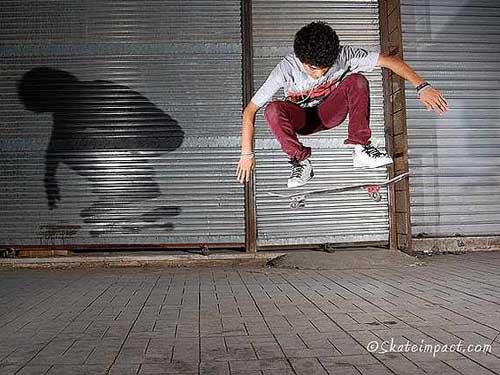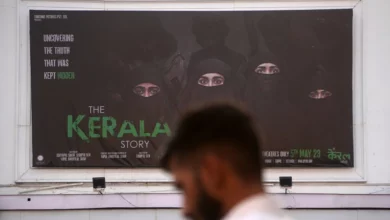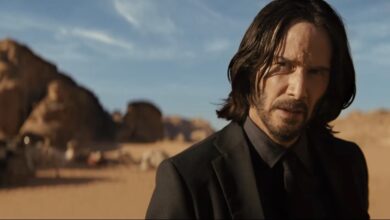
ALEXANDRIA — Lurking in the shadows of the many shoddy post-revolution films on Egypt lies a story not many people have heard. It is a story of determination and the pursuit of passions.
But this tale is not about the revolution or the religious petrification that continues to reverberate throughout the country.
It is an inspiring chronicle of broken boards, turning wheels and the people determined to ride them.
In his debut feature-length documentary “Slipping: Skate’s Impact on Egypt,” 26-year-old American filmmaker Brett Wiese Saunders offers a unique perspective into the lives of two brothers, Omar and Cherif Herrawi, as they work to establish Egypt’s first and only skate shop, Skate Impact, and build the skate scene.
Narrated by the Herrawi brothers, the hour-long biopic features interviews with various members of the Skate Impact team, as well as interviews with Egyptian independent filmmaker Ahmad Abdalla and actor Khaled Abol Nega.
As with each new day in Egypt, the film opens with the call for prayer, as the sun rises over stunning shots of Alexandria’s seaside landscape. Saunders captures the eerie quietness of the city’s early morning streets as the camera glides across graffiti-covered walls and scenes of locals preparing for the day.
Within moments, the distant sounds of rolling skateboards enter the sonic field and the camera closes in on several members of the Skate Impact team, who recite globalized plank-riding woes of being misunderstood and discarded by society.
The Herrawi brothers make for decent narrators; they candidly chronicle their introduction to the sport, which of course came from watching MTV in the mid-1990s, and their subsequent desire to develop a local skateboarding community.
Soon after, the brothers found toy skateboards in a local children’s store but quickly realized the boards’ inadequacy. They lacked proper wheels and a concave design, which made them break with each new trick.
In the late 1990s, the brothers received their first “real” board from abroad, igniting their transformation into skaters, while propelling their unwavering desire to seek out other skaters in Egypt. At the time, only a few rebellious souls were taking their wheels to Egypt’s streets.
After creating message boards and group chats on ICU and AOL Instant Messenger, the Herrawi brothers were able to track down a handful of skaters scattered across Alexandria and Cairo, and soon a small community began to form.
Over time, they had a network of nearly 35 skaters throughout Egypt. But one problem remained: an utter lack of durable skateboards and equipment.
With the emergence of YouTube in 2005, the Herrawi brothers began documenting the scene, filming and uploading tricks, while also directing other skaters to spots conducive to the sport. But, as their community continued to grow, so did the skaters’ needs — the available equipment in Egypt just was not cutting it, so the brothers began shipping boards, wheels and basic equipment.
Soon after, the Herrawi brothers created SkateImpact.com, an online store providing local skaters with new gear at an affordable price. The idea was not to make money but to develop the nascent subculture by giving the skaters the tools they needed to progress.
While the brothers carry most of the narrative weight of the film, the stars of the documentary are inevitably the skaters themselves. An interesting interview comes when professional skater Cairo Foster discusses his experience growing up in Egypt with his expat family.
He mentions the same difficulties in getting supplies from abroad, and the skaters’ extreme resourcefulness in utilizing the gear they had available to them — most notably, shoe glue and power drills.
Another interesting portrait comes from skater Yassin Kopton, who says Skate Impact and the skating scene essentially saved his life. Kopton’s segments portray the frustration and sense of isolation many youths felt under the stagnant decades of the Hosni Mubarak regime.
Kopton himself is no novice to the camera. He was featured prominently in Abdalla’s documentary-style fiction film “Microphone,” which explores the underground music, graffiti and skate scene in Alexandria.
Abdalla is featured later in Saunders’ documentary; he discusses why he chose to include skateboarders in “Microphone,” and comments on the burgeoning socially conscious skate community.
Actor Abol Nega also pops up, providing testimonies from skaters he spoke to while filming “Microphone.” The film ends with more testimonies from the skaters who say “skateboarding is a life changer and a life saver, but most importantly, it’s fun.”
Saunders shot the entire film on Canon 7D, with a variety of L lenses and a Man Frote tripod. For the audio, he used Zoom H1 for the ambient and hooked it to a lavalier microphone for interviews.
He was able to shoot, edit and produce the entire film for less than US$10,000, which he generated through Kickstarter.com, with most of the funding spent on paying the musicians who make up the film’s soundtrack.
Overall, the film provides an interesting, kinetic portrayal of Egypt’s emerging skateboarding community — mixed with beautiful landscape shots of Alexandria, footage from the protests taking place while Saunders was filming in fall 2011, and the unique platforms in which the skaters find spots to skate.
At times, and perhaps because of its tiny budget, the film feels like it’s slightly lacking in both narrative and style but it still makes for an insightful experience. And where the film may lack in story and style, it makes up for it with the many honest and genuine tales from the skaters themselves.
“Slipping” has already won a few small-town festival awards. Saunders won the New Hampshire Film Festival 2012 award for Best Filmmaker, and the documentary was also nominated for Best Story, Best Documentary, Best Cinematography and Best Director in the 2012 action sports film festival X-Dance 13.
“Slipping: Skate’s Impact on Egypt” is scheduled to premiere in Egypt later this year.




